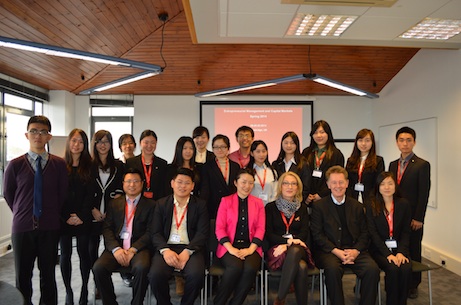
Xiaohan Pan studied biotechnology, but has now set up a business which brings Chinese students to the UK to learn about a range of subjects, including enterprise.
What can the Chinese learn about entrepreneurship from Cambridge and vice versa? A new course run by a Cambridge alumna aims to bring the two different experiences of business together.
Sixteen Chinese students and entrepreneurs attended the first course run by Wedge Education, a company set up by Gates Cambridge alumna Xiaohan Pan.
The course, held earlier this month, aimed to showcase Cambridge as an innovation cluster and show how it has achieved that status. Participants attended lectures given by Professor Chris Lowe, Professor Sabine Bahn, Dr William Bains and Dr Andy Smith on how to set up and run a high-tech company. They also visited Cambridge’s Science Park and the Standard Chartered Bank in London as well as London Metal Exchange as part of a two-week course. Xiaohan says: “Cambridge academics are unique. The lecturers who were speaking are not pure academics.”
Professor Bahn, head of the Bahn Laboratory at the University of Cambridge and co-founder of Psynova Neurotech, said: “I was very impressed by the quality and enthusiasm of the students and although I was only an examiner on the final day of the course, my impression was that the students had learned a great deal and very motivated to become active entrepreneurs. The experience was utterly enjoyable.”
Other programmes planned by Wedge Education include “family succession”, “security analysis” and “social enterprise”. Many are tailor-made to suit demand. They can be on any subject, but Xiaohan is keen to emphasise entrepreneurship and leadership.
Biotechnology
She did a PhD in Biotechnology at Cambridge and was working at a hedge fund. She left in early 2013 to set up Wedge Education with a friend who is now doing her PhD in Cambridge. She says: “I made this transition because I believe in the power of education in changing people’s lives.” The company designs and organises short-term training courses and visits to the leading institutions in the UK for aspiring people in emerging countries. They are focusing mainly on China, given UK interest in strengthening its ties with China, and on Oxford and Cambridge Universities.
Xiaohan, whose father set up a textile factory in China, has put together each course and has a colleague in China who helps with promotion on the Chinese equivalent of Facebook and with offline marketing.
The company builds on an exchange programme Xiaohan organised while she was a student at Cambridge University. In fact, it was partly as a result of catching up with one of the students who attended this course that she set up Wedge Education. He is now doing a PhD at Yale where he is president of the Chinese Students and Scholars Union. “He said that if he hadn’t attended my programme he wouldn’t have won his scholarship to Yale,” says Xiaohan. “He said the Cambridge exchange experience changed his life. I am proud of him and was deeply touched by his words. That’s why I made the transition from investment to education.”
The February course is not an end point in itself. The students were interviewed before being accepted on the course and the fact that some of those taking part are successful entrepreneurs have made it a valuable networking opportunity for when they return home. “We have become like a big family,” says Anqi Zhang who is majoring in financial management and government management. Each group, comprised of five to six students, is also given a mentor from the University of Cambridge who will keep in touch with them when they are back in China.
Twelve of the 16 students were female. Tianqi Zhou, a third year student of a four-year degree majoring in agronomy and doing a course in innovation and entrepreneurship management, says many Chinese believe that girls should go into stereotypical female roles like teaching and make “a good marriage” rather than go into business.
She and her fellow students found out about the course through its website and were won over by the course content, those teaching on it and Xiaohan Pan herself, who is well known at Zheijiang University for winning the Gates Cambridge Scholarship. Shilin, Tianqi and Anqi all study at Zhejiang which is in Hangzhou in Zhejiang Province just over 100 miles southwest of the booming business centre that is Shanghai. “Cambridge is the place most students at our university dream of,” says Shilin Yang, a second-year student who is majoring in finance and is at the selective Chukochen Honorable College for the brightest students.
Highlights
The students say the highlights of the course included their mentors, the course content and the elevator pitch contest in which the students had two days to work in teams to put together a business idea and pitch it to Cambridge professors. Shilin, who is still deciding what she wants to do after university, said the visit to the Standard Chartered Bank was interesting because it made her reflect on the importance of customer relations. “The manager spoke of his role being to connect the bank and its customers. This idea of the social role of a bank was new to me, but it makes sense as we are social beings,” she says.
All the students said the course had widened their perspectives on how business is done outside China.
The course has also given them an idea of what it might be like to study at Cambridge as well as inspiring them in their chosen field. Tianqi said the course had given her courage to pursue her ambitions in business. Anqi, whose father is an entrepreneur and wants her to take over from him, simply said the course had made her feel “more brave”.












